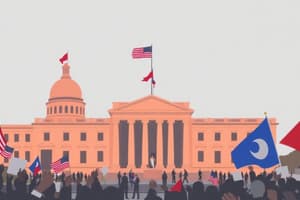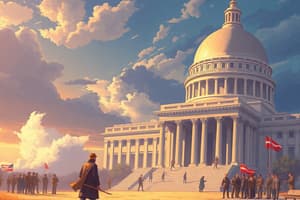Podcast
Questions and Answers
What is democracy and how is supreme power exercised within its framework?
What is democracy and how is supreme power exercised within its framework?
Democracy is a system of government where supreme power is vested in the people, exercised directly or indirectly through representation.
Explain the concept of popular sovereignty in the context of democracy.
Explain the concept of popular sovereignty in the context of democracy.
Popular sovereignty means that ultimate authority resides with the people, who are the source of all political power.
Why is the rule of law essential in a democratic society?
Why is the rule of law essential in a democratic society?
The rule of law ensures that everyone, including government officials, is subject to and accountable under the law, preventing arbitrary actions.
What role do free and fair elections play in a democracy?
What role do free and fair elections play in a democracy?
How does an independent judiciary support democratic governance?
How does an independent judiciary support democratic governance?
Discuss the significance of civil society in a democracy.
Discuss the significance of civil society in a democracy.
In what way does transparency and openness contribute to democracy?
In what way does transparency and openness contribute to democracy?
What mechanisms are in place to ensure government accountability in democracy?
What mechanisms are in place to ensure government accountability in democracy?
What is democracy and how does it value the diversity of its citizens?
What is democracy and how does it value the diversity of its citizens?
In what ways does citizen participation enhance democracy?
In what ways does citizen participation enhance democracy?
What role does a democratic framework play in conflict resolution?
What role does a democratic framework play in conflict resolution?
How does democracy protect individual rights?
How does democracy protect individual rights?
What is the significance of accountability in a democratic government?
What is the significance of accountability in a democratic government?
Explain how economic growth potential is linked to democracy.
Explain how economic growth potential is linked to democracy.
What challenges does democracy face in terms of inequality?
What challenges does democracy face in terms of inequality?
What is the 'tyranny of the majority' in a democratic context?
What is the 'tyranny of the majority' in a democratic context?
Flashcards
Popular Sovereignty Definition
Popular Sovereignty Definition
Ultimate authority belongs to the people, who are the source of political power.
Rule of Law Principle
Rule of Law Principle
Everyone, including government officials is accountable under the law.
Free & Fair Elections
Free & Fair Elections
Citizens choose representatives freely without coercion in regular elections.
Protection of Rights
Protection of Rights
Signup and view all the flashcards
Accountability of Gov't
Accountability of Gov't
Signup and view all the flashcards
Separation of Powers
Separation of Powers
Signup and view all the flashcards
Independent Judiciary
Independent Judiciary
Signup and view all the flashcards
Democracy
Democracy
Signup and view all the flashcards
Democracy's Value
Democracy's Value
Signup and view all the flashcards
Citizen Participation
Citizen Participation
Signup and view all the flashcards
Protecting Rights
Protecting Rights
Signup and view all the flashcards
Conflict Resolution
Conflict Resolution
Signup and view all the flashcards
Accountability in Gov
Accountability in Gov
Signup and view all the flashcards
Democracy & Economic Growth
Democracy & Economic Growth
Signup and view all the flashcards
Inequality in Democracy
Inequality in Democracy
Signup and view all the flashcards
Tyranny of the Majority
Tyranny of the Majority
Signup and view all the flashcards
Study Notes
Defining Democracy
- Democracy is a system of government where supreme power is vested in the people and exercised by them directly or indirectly through a system of representation, typically involving periodic free and fair elections.
Characteristics of Democracy
- Popular Sovereignty: Ultimate authority resides with the people, who are the source of all political power. Citizens have the right to participate in decision-making through various means.
- Rule of Law: Everyone, including government officials, is subject to and accountable under the law. This ensures fairness and prevents arbitrary actions by those in power.
- Free and Fair Elections: Regular, competitive elections are held where eligible citizens can choose their representatives and leaders without coercion or intimidation. These elections are crucial to ensure accountability and responsiveness of the government.
- Protection of Rights and Freedoms: Fundamental human rights, such as freedom of speech, assembly, religion, and the press, are protected and enshrined in the constitution or legal framework of the democracy. These rights allow citizens to express their views and hold their leaders accountable.
- Accountability of the Government: The government, its officials and institutions, are held accountable to the people for their actions. Mechanisms like elections, independent judiciaries, and freedom of information allow citizens to review and question governmental decisions.
- Separation of Powers: Different branches of government (executive, legislative, and judicial) have distinct powers and responsibilities to avoid concentration of power. These separate branches act as checks and balances on each other, preventing abuse of power.
- Independent Judiciary: An independent judiciary interprets laws impartially and ensures that the system of justice works fairly and impartially, offering a check on the executive/legislative branches.
- Civil Society: A vibrant civil society with free and independent organizations, such as non-governmental organizations (NGOs) and interest groups, exists. These groups participate in public life, advocating for citizens and providing a vital platform for citizen voices.
- Transparency and Openness: Government processes and decisions are generally transparent and accessible to the public. This allows for accountability and informed citizen participation.
- Tolerance and Respect for Diversity: A democracy values and respects the diversity of its citizens, including differing views, opinions, and beliefs.
Advantages of Democracy
- Enhanced Citizen Participation: Citizens have a voice in shaping their government and policies, leading to increased ownership and legitimacy of the democratic system.
- Protection of Individual Rights: Democracies typically enshrine and protect fundamental rights and freedoms, ensuring that citizens are treated with dignity and respect.
- Peaceful Conflict Resolution: A strong democratic framework fosters dialogue and compromise as a means of resolving conflict and differences.
- Accountability and Responsiveness: In contrast to authoritarian systems, government officials are held accountable to the electorate, leading to greater responsiveness to public needs.
- Economic Growth Potential: The freedom, rule of law, and transparency of democracy provide an environment conducive to economic growth and development. Free markets and entrepreneurship thrive in this environment.
- Innovation and Creativity: Democratic societies often facilitate innovation and progress by encouraging openness, debate, and competition.
- Stability: Over the long term, generally democracies are more stable, as dissatisfaction is channeled through the system and alternatives emerge through peaceful elections.
Limits and Challenges of Democracy
- Inequality: The unequal access to resources and political power within a democracy can impede the realisation of popular sovereignty and create divisions within society.
- Mobilization of Emotions: Negative emotions, like fear and anger, can sometimes be mobilized during political processes, interfering with reasoned debate and transparency.
- Influence of Special Interests: Powerful groups or wealthy individuals can potentially exert undue influence on the democratic process, which is a critical consideration for the well-functioning of a democracy.
- Tyranny of the Majority: A potential concern is that the majority's desires could violate the rights of minorities. Safeguarding minority rights is crucial to maintaining the legitimacy of the system. Political discourse often addresses how to balance minority needs with majority interests.
- Voter Apathy and Low Turnout: Voter apathy and low turnout can undermine the legitimacy of a democratic system and lead to decisions not truly reflective of the population's preference.
Studying That Suits You
Use AI to generate personalized quizzes and flashcards to suit your learning preferences.




